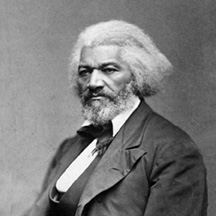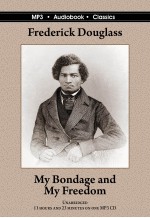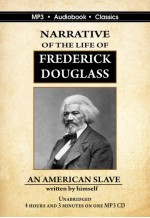Frederick Douglass
|
Frederick Douglass (c. February 1818 – February 20, 1895) began life as a slave and escaped bondage to become an orator, writer, and social reformer who became a national leader of the abolitionist movement. He was noted for his dazzling oratorical skills and insightful antislavery writings. He was the first articulate, literate, and educated Afro-American many whites had ever met. Shortly after publication of his Narrative he traveled to Ireland and England to avoid recapture, and wrote eloquently of the revelation of being treated “not as a color, but as man”. During his trip he became legally free when supporters raised the funds to purchase his freedom from owner Thomas Auld. After his return to the United States he was active as a speaker and publisher of abolitionist journals. His social activism was not limited to abolition; he was a dedicated supporter of women’s suffrage and spoke eloquently in favor of women’s suffrage at the first women’s rights convention in 1848. He conferred with President Lincoln on the treatment of black soldiers and after the war with President Johnson on black suffrage. He was the keynote speaker at the dedication of the Emancipation Memorial in Lincoln Park in 1973. His first marriage to free black woman Anna lasted 44 years and bore 5 children. After her death he provoked controversy when he married a white suffragist in 1884, to which he responded that his first marriage was to a person the color of his mother and his second to a woman the color of his father. Cedar Hill, his home in the Anacostia section of Washington, is a National Historic Site. |
My Bondage and My Freedom
"My Bondage and My Freedom" is an autobiographical narrative by Frederick Douglass, a prominent Afri..
$11.99
Narrative of the Life of Frederick Douglass
Narrative of the Life of Frederick Douglass is the first and most popular of three memoirs Frederick..
$9.99



